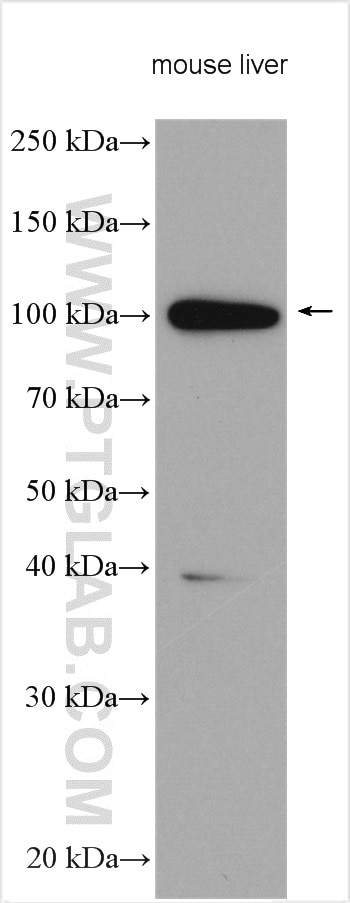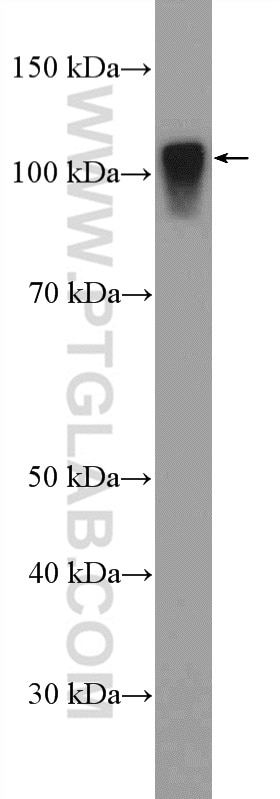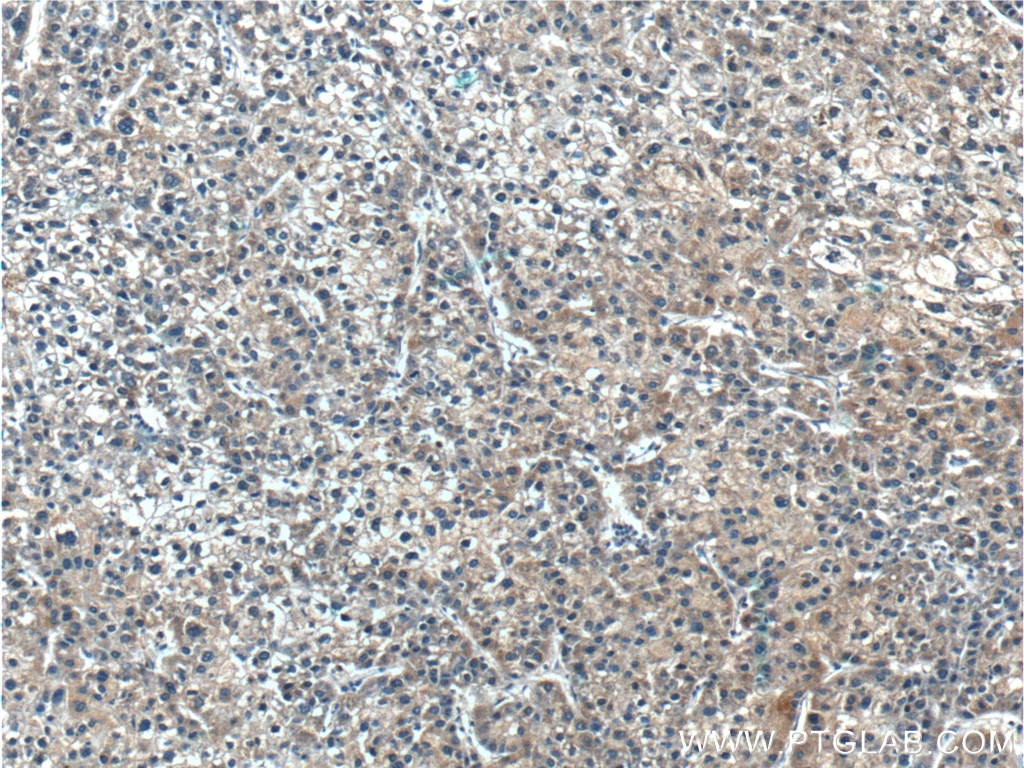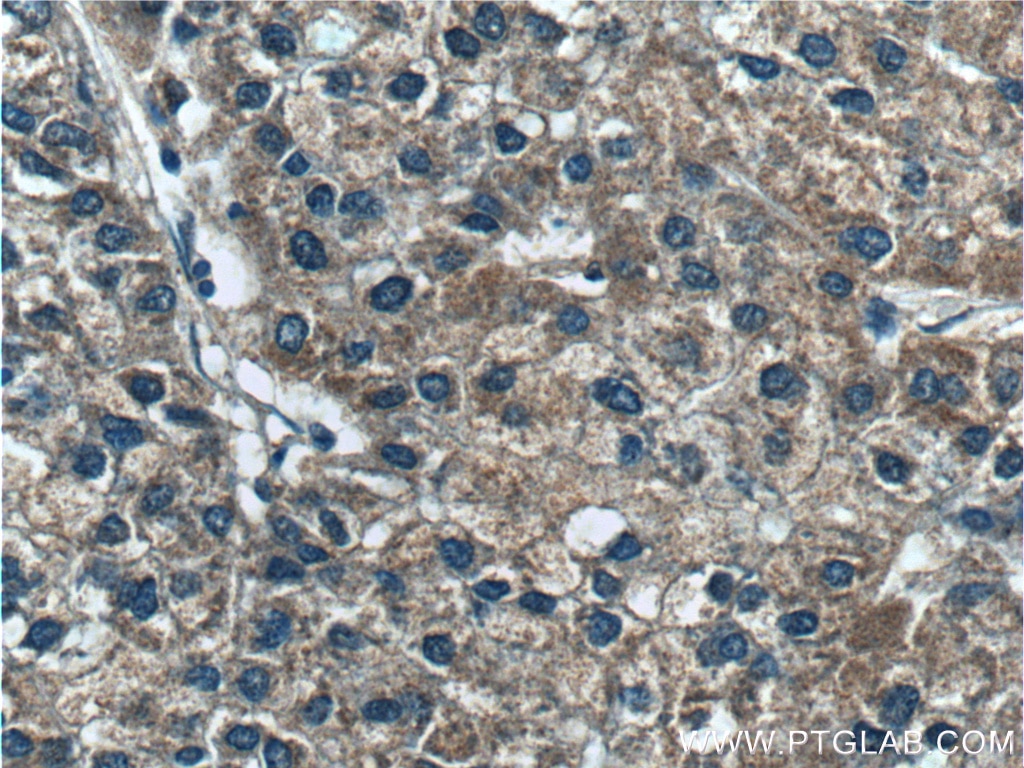SARDH Polyklonaler Antikörper
SARDH Polyklonal Antikörper für WB, IHC, ELISA
Wirt / Isotyp
Kaninchen / IgG
Getestete Reaktivität
human, Maus, Ratte
Anwendung
WB, IHC, ELISA
Konjugation
Unkonjugiert
Kat-Nr. : 22762-1-AP
Synonyme
Geprüfte Anwendungen
| Erfolgreiche Detektion in WB | Mauslebergewebe, Rattenlebergewebe |
| Erfolgreiche Detektion in IHC | humanes Leberkarzinomgewebe Hinweis: Antigendemaskierung mit TE-Puffer pH 9,0 empfohlen. (*) Wahlweise kann die Antigendemaskierung auch mit Citratpuffer pH 6,0 erfolgen. |
Empfohlene Verdünnung
| Anwendung | Verdünnung |
|---|---|
| Western Blot (WB) | WB : 1:1000-1:4000 |
| Immunhistochemie (IHC) | IHC : 1:50-1:500 |
| It is recommended that this reagent should be titrated in each testing system to obtain optimal results. | |
| Sample-dependent, check data in validation data gallery | |
Veröffentlichte Anwendungen
| WB | See 3 publications below |
| IHC | See 1 publications below |
Produktinformation
22762-1-AP bindet in WB, IHC, ELISA SARDH und zeigt Reaktivität mit human, Maus, Ratten
| Getestete Reaktivität | human, Maus, Ratte |
| In Publikationen genannte Reaktivität | human, Maus, Ratte |
| Wirt / Isotyp | Kaninchen / IgG |
| Klonalität | Polyklonal |
| Typ | Antikörper |
| Immunogen | SARDH fusion protein Ag18738 |
| Vollständiger Name | sarcosine dehydrogenase |
| Berechnetes Molekulargewicht | 918 aa, 101 kDa |
| Beobachtetes Molekulargewicht | 100 kDa |
| GenBank-Zugangsnummer | BC136364 |
| Gene symbol | SARDH |
| Gene ID (NCBI) | 1757 |
| Konjugation | Unkonjugiert |
| Form | Liquid |
| Reinigungsmethode | Antigen-Affinitätsreinigung |
| Lagerungspuffer | PBS with 0.02% sodium azide and 50% glycerol |
| Lagerungsbedingungen | Bei -20°C lagern. Nach dem Versand ein Jahr lang stabil Aliquotieren ist bei -20oC Lagerung nicht notwendig. 20ul Größen enthalten 0,1% BSA. |
Hintergrundinformationen
SARDH is a mitochondrial flavoenzyme that oxidizes sarcosine to glycine, feeding one-carbon units into folate metabolism. By tuning methyl-group balance, it modulates epigenetic programs and immune fate. Silencing or mutation of SARDH drives sarcosine accumulation, fueling invasion in prostate, liver, breast and kidney cancers, whereas its high expression predicts favorable prognosis. Thus SARDH acts as a metabolic tumor-suppressor and an emerging therapeutic target. (PMID: 23824605; 40830700; 31545450)
Protokolle
| PRODUKTSPEZIFISCHE PROTOKOLLE | |
|---|---|
| WB protocol for SARDH antibody 22762-1-AP | Protokoll herunterladen |
| IHC protocol for SARDH antibody 22762-1-AP | Protokoll herunterladenl |
| STANDARD-PROTOKOLLE | |
|---|---|
| Klicken Sie hier, um unsere Standardprotokolle anzuzeigen |
Publikationen
| Species | Application | Title |
|---|---|---|
Cell Biochem Biophys Brucine Suppresses Malignant Progression of Prostate Cancer by Decreasing Sarcosine Accumulation via Downregulation of GNMT in the Glycine/sarcosine Metabolic Pathway | ||
Sci Rep Mutation in Smek2 regulating hepatic glucose metabolism causes hypersarcosinemia and hyperhomocysteinemia in rats | ||
Brain Res Brain transcriptomic, metabolic and mitohormesis properties associated with N-propargylglycine treatment: a prevention strategy against neurodegeneration | ||
J Cancer Sarcosine dehydrogenase as an immune infiltration-associated biomarker for the prognosis of hepatocellular carcinoma |





